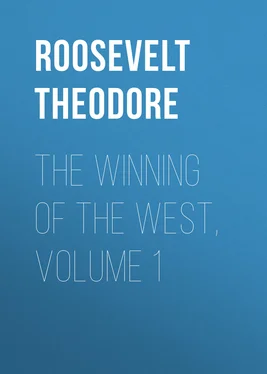Theodore Roosevelt - The Winning of the West, Volume 1
Здесь есть возможность читать онлайн «Theodore Roosevelt - The Winning of the West, Volume 1» — ознакомительный отрывок электронной книги совершенно бесплатно, а после прочтения отрывка купить полную версию. В некоторых случаях можно слушать аудио, скачать через торрент в формате fb2 и присутствует краткое содержание. Жанр: foreign_prose, История, foreign_edu, foreign_antique, на английском языке. Описание произведения, (предисловие) а так же отзывы посетителей доступны на портале библиотеки ЛибКат.
- Название:The Winning of the West, Volume 1
- Автор:
- Жанр:
- Год:неизвестен
- ISBN:нет данных
- Рейтинг книги:5 / 5. Голосов: 1
-
Избранное:Добавить в избранное
- Отзывы:
-
Ваша оценка:
- 100
- 1
- 2
- 3
- 4
- 5
The Winning of the West, Volume 1: краткое содержание, описание и аннотация
Предлагаем к чтению аннотацию, описание, краткое содержание или предисловие (зависит от того, что написал сам автор книги «The Winning of the West, Volume 1»). Если вы не нашли необходимую информацию о книге — напишите в комментариях, мы постараемся отыскать её.
The Winning of the West, Volume 1 — читать онлайн ознакомительный отрывок
Ниже представлен текст книги, разбитый по страницам. Система сохранения места последней прочитанной страницы, позволяет с удобством читать онлайн бесплатно книгу «The Winning of the West, Volume 1», без необходимости каждый раз заново искать на чём Вы остановились. Поставьте закладку, и сможете в любой момент перейти на страницу, на которой закончили чтение.
Интервал:
Закладка:
The French inhabitants were in very many cases not of pure blood. The early settlements had been made by men only, by soldiers, traders, and trappers, who took Indian wives. They were not trammelled by the queer pride which makes a man of English stock unwilling to make a red-skinned woman his wife, though anxious enough to make her his concubine. Their children were baptized in the little parish churches by the black-robed priests, and grew up holding the same position in the community as was held by their fellows both of whose parents were white. But, in addition to these free citizens, the richer inhabitants owned both red and black slaves; negroes imported from Africa, or Indians overcome and taken in battle. 21 21 Fergus Historical Series, No. 12, "Illinois in the 18th Century." Edward G. Mason, Chicago, 1881. A most excellent number of an excellent series. The old parish registers of Kaskaskia, going back to 1695, contain some remarkable names of the Indian mothers—such as Maria Aramipinchicoue and Domitilla Tehuigouanakigaboucoue. Sometimes the man is only distinguished by some such title as "The Parisian," or "The Bohemian."
There were many freedmen and freedwomen of both colors, and in consequence much mixture of blood.
They were tillers of the soil, and some followed, in addition, the trades of blacksmith and carpenter. Very many of them were trappers or fur traders. Their money was composed of furs and peltries, rated at a fixed price per pound; 22 22 Billon, 90.
none other was used unless expressly so stated in the contract. Like the French of Europe, their unit of value was the livre, nearly equivalent to the modern franc. They were not very industrious, nor very thrifty husbandmen. Their farming implements were rude, their methods of cultivation simple and primitive, and they themselves were often lazy and improvident. Near their town they had great orchards of gnarled apple-trees, planted by their forefathers when they came from France, and old pear-trees, of a kind unknown to the Americans; but their fields often lay untilled, while the owners lolled in the sunshine smoking their pipes. In consequence they were sometimes brought to sore distress for food, being obliged to pluck their corn while it was still green. 23 23 Letter of P. A. Lafarge, Dec. 31, 1786. Billon, 268.
The pursuits of the fur trader and fur trapper were far more congenial to them, and it was upon these that they chiefly depended. The half-savage life of toil, hardship, excitement, and long intervals of idleness attracted them strongly. This was perhaps one among the reasons why they got on so much better with the Indians than did the Americans, who, wherever they went, made clearings and settlements, cut down the trees, and drove off the game.
But even these pursuits were followed under the ancient customs and usages of the country, leave to travel and trade being first obtained from the commandant 24 24 State Department MSS., No. 150, Vol. III., p. 519. Letter of Joseph St. Mann, Aug 23, 1788.
for the rule of the commandant was almost patriarchal. The inhabitants were utterly unacquainted with what the Americans called liberty. When they passed under our rule, it was soon found that it was impossible to make them understand such an institution as trial by jury; they throve best under the form of government to which they had been immemorially accustomed—a commandant to give them orders, with a few troops to back him up. 25 25 Do ., p 89, Harmar's letter.
They often sought to escape from these orders, but rarely to defy them; their lawlessness was like the lawlessness of children and savages; any disobedience was always to a particular ordinance, not to the system.
The trader having obtained his permit, built his boats,—whether light, roomy bateaux made of boards, or birch-bark canoes, or pirogues, which were simply hollowed out logs. He loaded them with paint, powder, bullets, blankets, beads, and rum, manned them with hardy voyageurs, trained all their lives in the use of pole and paddle, and started off up or down the Mississippi, 26 26 Do ., p 519, Letter of Joseph St. Marin.
the Ohio, or the Wabash, perhaps making a long carry or portage over into the Great Lakes. It took him weeks, often months, to get to the first trading-point, usually some large winter encampment of Indians. He might visit several of these, or stay the whole winter through at one, buying the furs. 27 27 Do ., p. 89.
Many of the French coureurs des bois, whose duty it was to traverse the wilderness, and who were expert trappers, took up their abode with the Indians, taught them how to catch the sable, fisher, otter, and beaver, and lived among them as members of the tribe, marrying copper-colored squaws, and rearing dusky children. When the trader had exchanged his goods for the peltries of these red and white skin-hunters, he returned to his home, having been absent perhaps a year or eighteen months. It was a hard life; many a trader perished in the wilderness by cold or starvation, by an upset where the icy current ran down the rapids like a mill-race, by the attack of a hostile tribe, or even in a drunken brawl with the friendly Indians, when voyageur, half-breed, and Indian alike had been frenzied by draughts of fiery liquor. 28 28 Journal of Jean Baptiste Perrault, in 1783; in "Indian Tribes," by Henry R. Schoolcraft, Part III., Philadelphia, 1855. See also Billon, 484, for an interesting account of the adventures of Gratiot, who afterwards, under American rule, built up a great fur business, and drove a flourishing trade with Europe, as well as the towns of the American seaboard.
Next to the commandant in power came the priest. He bore unquestioned rule over his congregation, but only within certain limits; for the French of the backwoods, leavened by the presence among them of so many wild and bold spirits, could not be treated quite in the same way as the more peaceful habitants of Lower Canada. The duty of the priest was to look after the souls of his sovereign's subjects, to baptize, marry, and bury them, to confess and absolve them, and keep them from backsliding, to say mass, and to receive the salary due him for celebrating divine service; but, though his personal influence was of course very great, he had no temporal authority, and could not order his people either to fight or to work. Still less could he dispose of their laud, a privilege inhering only in the commandant and in the commissaries of the villages, where they were expressly authorized so to do by the sovereign. 29 29 State Department MSS., No. 48, p. 25. A petition concerning a case in point, affecting the Priest Gibault.
The average inhabitant, though often loose in his morals, was very religious. He was superstitious also, for he firmly believed in omens, charms, and witchcraft, and when worked upon by his dread of the unseen and the unknown he sometimes did terrible deeds, as will be related farther on.
Under ordinary circumstances he was a good-humored, kindly man, always polite—his manners offering an agreeable contrast to those of some of our own frontiersmen,—with a ready smile and laugh, and ever eager to join in any merrymaking. On Sundays and fast-days he was summoned to the little parish church by the tolling of the old bell in the small wooden belfry. The church was a rude oblong building, the walls made out of peeled logs, thrust upright in the ground, chinked with moss and coated with clay or cement. Thither every man went, clad in a capote or blanket coat, a bright silk handkerchief knotted round his head, and his feet shod with moccasins or strong rawhide sandals. If young, he walked or rode a shaggy pony; if older, he drove his creaking, springless wooden cart, untired and unironed, in which his family sat on stools. 30 30 "History of Vincennes," by Judge John Law, Vincennes, 1858. pp. 18 and 140. They are just such carts as I have seen myself in the valley of the Red River, and in the big bend of the Missouri, carrying all the worldly goods of their owners, the French Metis. These Metis,—ex-trappers, ex-buffalo runners, and small farmers,—are the best representatives of the old French of the west; they are a little less civilized, they have somewhat more Indian blood in their veins, but they are substantially the same people. It may be noted that the herds of buffaloes that during the last century thronged the plains of what are now the States of Illinois and Indiana furnished to the French of Kaskaskia and Vincennes their winter meat; exactly as during the present century the Saskatchewan Metis lived on the wild herds until they were exterminated.
Интервал:
Закладка:
Похожие книги на «The Winning of the West, Volume 1»
Представляем Вашему вниманию похожие книги на «The Winning of the West, Volume 1» списком для выбора. Мы отобрали схожую по названию и смыслу литературу в надежде предоставить читателям больше вариантов отыскать новые, интересные, ещё непрочитанные произведения.
Обсуждение, отзывы о книге «The Winning of the West, Volume 1» и просто собственные мнения читателей. Оставьте ваши комментарии, напишите, что Вы думаете о произведении, его смысле или главных героях. Укажите что конкретно понравилось, а что нет, и почему Вы так считаете.












